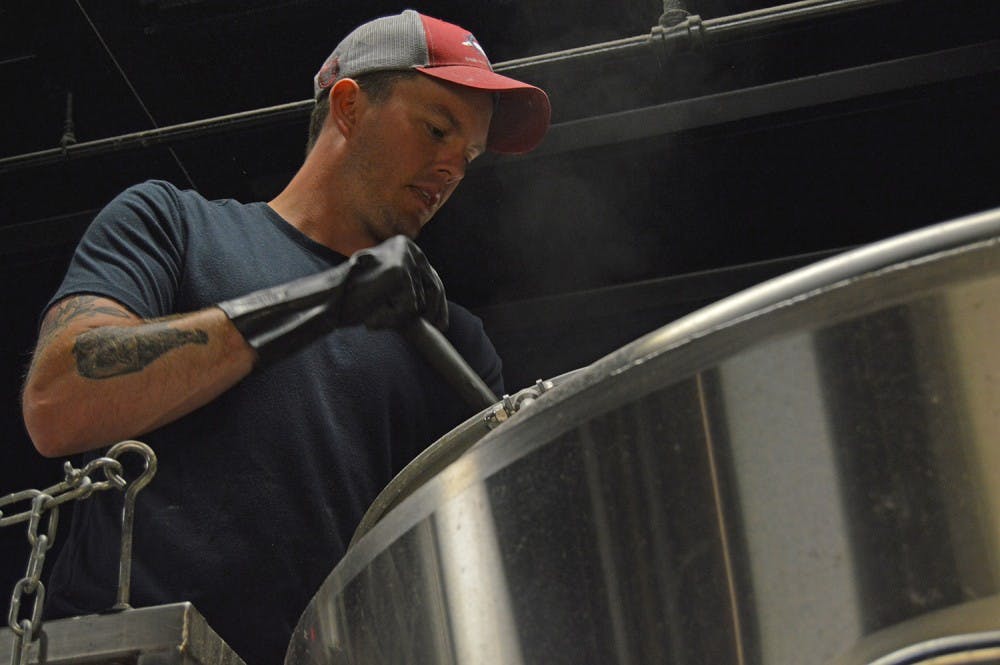Though it isn’t a reality for most breweries now, Margo Knight Metzger, the executive director of the N.C. Craft Brewers Guild, emphasizes that the breweries hitting the cap now are only a few years old.
“They grow fast,” she said.
“Some of them grow 100 percent year after a year, or more. I mean, craft brewing is growing by leaps and bounds.”
North Carolina is a hub for craft brewery, Metzger said.
Breweries like Sierra Nevada and New Belgium set up expansions in the state, and Metzger said the owners of those breweries have told her they couldn’t have reached that sort of success unless they were able to self-distribute until they were ready to sign.
“We’d like to see one of our homegrown North Carolina breweries succeed like that,” she said.
“It’s going to be really hard for them to do it if they’re forced to go with a wholesaler before they’re ready.”
An inefficient process
Fullsteam Brewery is located in downtown Durham, next door to The Pit, a popular barbecue restaurant. Fullsteam’s brews are often on tap at The Pit, and it’s an easy process — The Pit buys the beer, and it can go directly from Fullsteam to the restaurant.
But under state law, the minute that Fullsteam hits the 25,000 barrel cap, it won’t work that way anymore.
An easy transaction would then have to go from Fullsteam to the third-party wholesaler and then back to The Pit, raising prices for the restaurant and reducing revenue for Fullsteam.
“The reality is, once we sign, we’ll have to go through this incredibly inefficient process,” Wilson said.
To get the day's news and headlines in your inbox each morning, sign up for our email newsletters.
“We’re not serving the customer as well. We believe we know really how to service our customers and treat them the way they want to be treated.”
When a brewery begins to distribute outside of its taproom, the owners make the decision to invest in distribution infrastructure — like distribution employees or a truck.
Wilson said if a brewer makes that sort of investment, they think that it will be best for their business.
The production cap adds an extra step in the process of distributing beer, especially for breweries that distribute to one city like the Olde Mecklenburg Brewery or NoDa Brewing Company in Charlotte.
“Just to put it in perspective, if you were brewing 25,000 barrels and all of a sudden you had to turn over your full allotment to wholesalers, in order to make the same amount of money, you’d have to sell 40,000 barrels immediately,” Metzger said.
Franchise law
It’s a double whammy for craft brewers at 25,000 barrels of production — not only must brewers sign with a wholesaler and lose 30 percent of revenue, but franchise law kicks in as well.
“You have to sign a contract to give up your business forever,” Wilson said.
Metzger compares franchise law to divorce: it’s easier to divorce a person in North Carolina than it is to divorce a wholesaler.
“It’s for life,” she said.
“If you’re at 25,000 barrels and you sign with a wholesaler in North Carolina, it’s for life. No matter what your contract says, no matter how many provisions you put in that contract, meaningless.”
Losing leverage
Isley explains that when a brewery hits that 25,000 cap, wholesalers know and change how they bargain.
When a brewery is small and has time to look around, the owners can find a wholesaler and a contract that works best. But when a brewery is producing right at or around 25,000 barrels, its leverage is gone, Isley said. The brewers will have to reduce production or sign — and if they choose to sign, the wholesaler has the advantage.
“The legislation puts the leverage into the distributors’ hands once you start getting up there,” he said.
But it’s important to remember the distributors aren’t evil, said Jamie Bartholomaus, the owner of Foothills Brewing in Winston-Salem.
In fact, he thinks that they’ve made a big, positive impact on North Carolina’s craft beer boom — just not necessarily when a brewery is forced to sign with a wholesaler at an arbitrary point.
“There’s also a very strong case to be made to use distributors,” Bartholomaus said. “The benefits that they can provide breweries are very strong as well. I’m very much in support of the system in general. It’s very important, it’s gotten our industry where it’s gotten today.”
Old Mecklenburg, NoDa and Red Oak Brewery in Greensboro are joining together with other breweries to create an organization called Craft Freedom.
“All we want is what’s fair,” the website for Craft Freedom reads.
For Metzger, who has worked both in breweries and in distributing, it’s time for a change. The current production cap and its requirements are slowing growth in an industry that keeps growing.
“It’s arbitrary. It’s anti-conservative. It goes against free market principles.”
@ladisicpaige
editor@dailytarheel.com




